Europe, British Isles, North-East England, Northumberland, Tynedale, Blanchland Abbey [Map]
Blanchland Abbey is in Blanchland [Map].
The village of Blanchland [Map] composed of buildings of the Abbey including its Gatehouse.
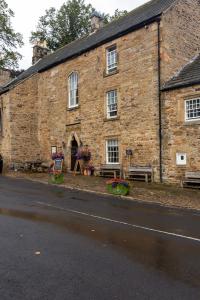
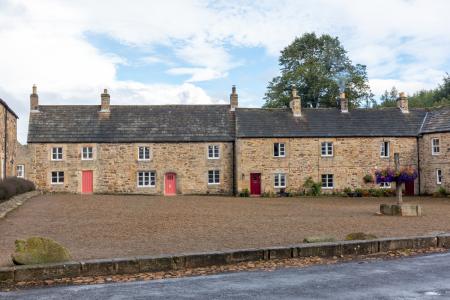
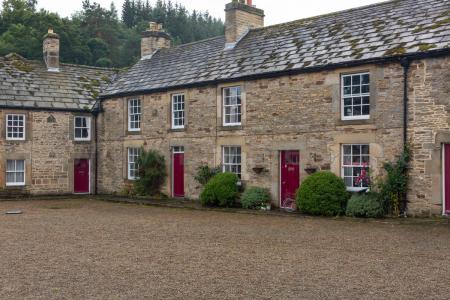
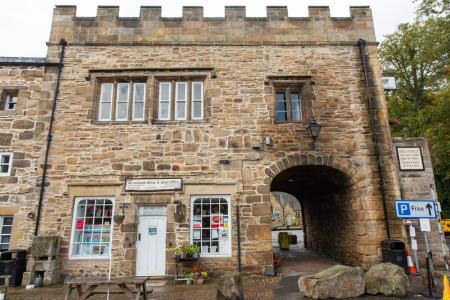
Medieval Grave Slabs at Blanchland Abbey [Map].
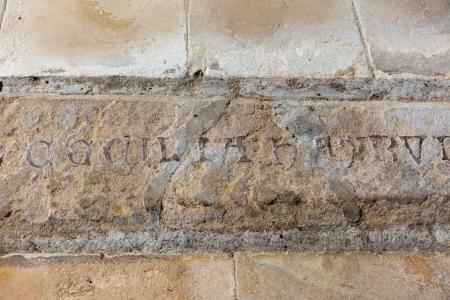
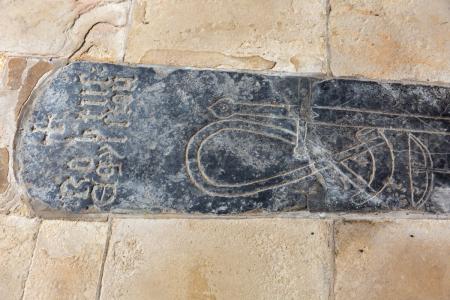
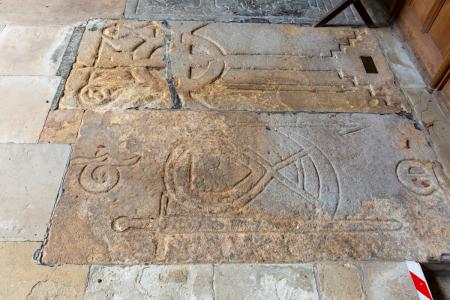
1165. Blanchland Abbey [Map] was founded as a premonstratensian priory in 1165 by Walter de Bolbec II (age 25) as a daughter house of Croxden Abbey, Staffordshire [Map]. It became an abbey in the late 13th century.
Blanchland Abbey [Map].
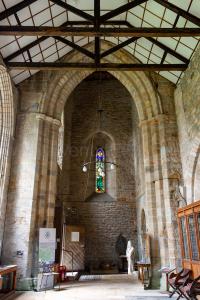
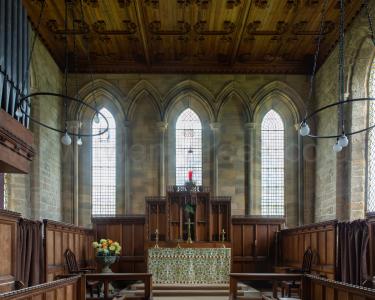
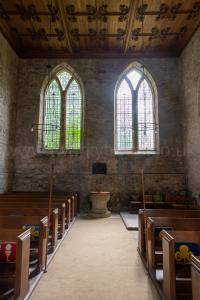
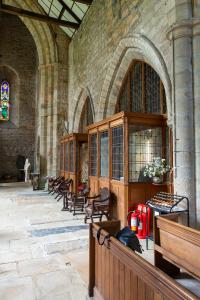
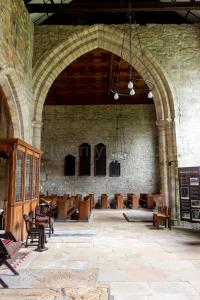
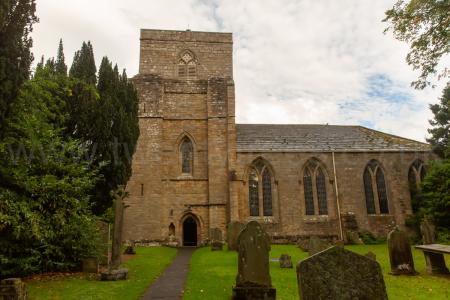
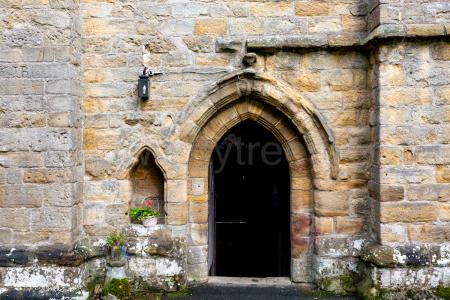
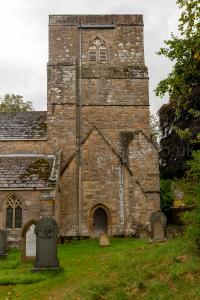
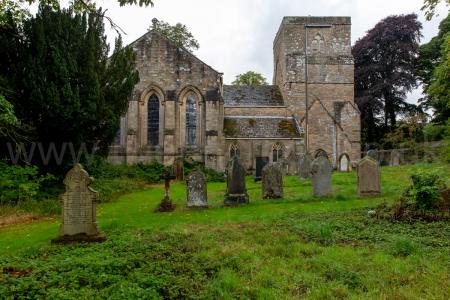
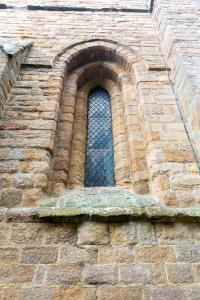
In 1539 Blanchland Abbey [Map] was dissolved and granted to the Bellow and Broxholm families. It was later acquired by the Radclyffe family from whom it passed by marriage to Nicholas Forster. Part of the abbey church was altered and retained for use as the parish church, and the abbots' former residence became the manor house.
Around 10 Aug 1607 Jane Radclyffe of Blanchland (age 56) died. Claudius Forster 1st Baronet (age 32) inherited Blanchland Abbey [Map].
Around 1623 Claudius Forster 1st Baronet (age 48) died without issue at Blanchland Abbey [Map]. He was buried at St Aidan's Church, Bamburgh [Map]. Baronet Forster of Bamburgh extinct. His brother John Forster (age 46) inherited his estates including Blanchland Abbey [Map].
Before 1625. Arms of King James I of England and Ireland and VI of Scotland (age 58) at Blanchland Abbey [Map].
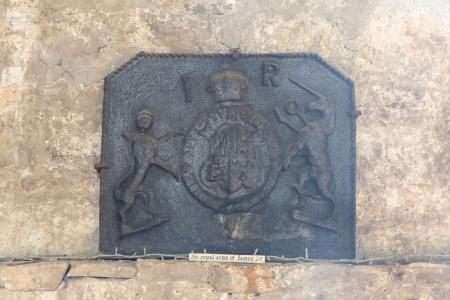
Froissart. And thus they continued day by day the space of eight days, abiding every day the returning again of the Scots, who knew no more where the English host lay than they knew where they were; so each of them were ignorant of other. Thus three days and three nights they were in manner without bread, wine, candle or light, fodder or forage, or any manner of purveyance, either for horse or man: and after the space of four days a loaf of bread was sold for sixpence the which was worth but a penny, and a gallon of wine for six groats that was worth but sixpence. And yet for all that, there was such rage of famine that each took victuals out of other's hands, whereby there rose divers battles and strifes between sundry companions; and yet beside all these mischiefs it never ceased to rain all the whole week, whereby their saddles, panels and countersingles were all rotten and broken, and most part of their horses hurt on their backs: nor they had not wherewith to shoe them that were unshod, nor they had nothing to cover themselves withal from the rain and cold but green bushes and their armour, nor they had nothing to make fire withal but green boughs, the which would not burn because of the rain. In this great mischief they were all the week without hearing of any word of the Scots, upon trust they should repass again into their own countries the same way or near thereabout; whereby great noise and murmur began to rise in the host, for some said and laid it to others' charge that by their counsel the king and all they were brought into that danger, and that they had done it to betray the king and all his host. Wherefore it was ordained by the king and by his council that the next morning they should remove the host and repass again the river about seven mile thence, whereas they might pass more at their ease. Then it was cried throughout the host that every man should be ready apparelled to remove the next day betimes.: also there was a cry made that whosoever could bring to the king certain knowledge where the Scots were, he that brought first tidings thereof should have for his labour a hundred pounds [of] land to him and to his heirs for ever, and to be made a knight of the king's hand.
When this cry was made in the host, divers English knights and squires to the number of fifteen or sixteen, for covetise of winning of this promise, they passed the river in great peril and rode forth through the mountains, and departed each one from other, taking their adventure. The next morning the host dislodged and rode fair and easily all the day, for they were but evil apparelled, and did so much that they day till it was noon, and then they found some villages brent by the Scots, and thereabout was some champaign country with corn and meadows, and so that night the host lodged there. Again the third day they rode forth, so that the most part of the host wist not which way, for they knew not the country nor they could hear no tidings of the Scots. And again the fourth day they rode forth in like manner, till it was about the hour of three, [Note. Translation error. Should 9am] and there came a squire fast riding toward the king and said: 'An it like your grace, I have brought you perfect tidings of the Scots your enemies. Surely they be within three mile of you, lodged on a great mountain, abiding there for you; and there they have been all this eight days, nor they knew no more tidings of you than ye did of them. Sir, this that I skew you is of truth, for I approached so near to them that I was taken prisoner and brought before the lords of their host; and there I skewed them tidings of you, and how that ye seek for them to the intent to have battle. And the lords did quit me my ransom and prison, when I had skewed them how your grace had promised a hundred pounds sterling of rent to him that brought first tidings of them to you; and they made me to promise that I should not rest till I had skewed you this tidings, for they said they had as great desire to fight with you as ye had with them: and there shall ye find them without fault' And as soon as the king had heard this tidings, he assembled all his host in a fair meadow to pasture their horses; and beside there was a little abbey [Map], the which was all brent, called in the days of king Arthur le Blanche Lande. There the king confessed him, and every man made him ready. The king caused many masses to be sung to housed all such as had devotion thereto; and incontinent he assigned a hundred pounds sterling of rent to the squire that had brought him tidings of the Scots, according to his promise, and made him knight [with] his own hands' before all the host.